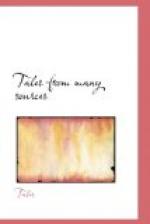Mr. Ives beheld with some surprise his daughter and her friend in full converse with a stranger.
The scene was worthy of a Watteau’s brush—the sun just sinking behind the orchard trees gilding the edge of each leaf, shone on the dark red of John Johnstone’s dress, warmed the sombre hue of fair Betty’s lincoln green, and played on the blue and primrose of Mistress Mary’s flower-like costume. It was a fair picture, and no eye could rest on a goodlier couple than the tall lithe young man, and the noble maiden.
“It was courteous of him to pay us one of the first, nay, the first of his neighbourly visits,” said the good parson, exchanging his tie-wig for a comfortable flannel night-cap, when he was once more alone with his daughter.
“Next time he comes I will reward him with some of our golden plums,” said Betty gaily as she fixed her white teeth in the tender skin of one that was lusciously ripe.
Mistress Mary to her maid described the newcomer thus:
“He is tall, Deborah, very tall; slight, but with shoulders of great breadth, and a square neck—one would say that his strength was herculean. His eyes are dark blue, his nose a trifle arched, brows thick and square, a sweet mouth—a very sweet mouth—but wondrous stern all the same. But his manners, Deborah, and his curling dark hair, just slightly dashed with powder—his manners are perfect! his hair is divine! Heigh-ho, Deborah!”
CHAPTER III.
Up from the plains a steep road rose on the downs, a road so steep, so dazzling white that it looked like a white thread hanging on a green surface.
Betty Ives rode slowly up the hill, leaning slightly forward to ease her horse as she did so. Though November had set in, the sun was still powerful, and both horse and rider were a little oppressed by its heat.
Some very close observer might have seen a change in the girl’s face—a very slight change, something that deepened the expression of the lovely eyes, something that played softly like the shadow of a great happiness on the mobile lips. She was thinking, thinking deeply as she rode.
Folks said that Betty Ives was very hard to win. Ruth Thornton, the squire’s buxom daughter, would have given years of her life for one of the passionate appeals young Robins had made so often to Betty in vain. Lady Rachel Tremame had almost broken her heart when Betty, at the Newbury ball, had so attracted Sir Harry Clare that he had no eyes for other than her. Yet amid her many adorers, fair Betty, with the carelessness of inexperience, passed unpitying and fancy free.
But now times were changed: fair Betty’s heart was given away.
Yet John Johnstone had not found his courtship easy, it was long before he made any way. He wooed proudly, and she took his subjection as due to herself, and was not grateful for that which she deemed her right. But the young man loved her the better for this, for he was one of those who value most that which is hardest to gain.




